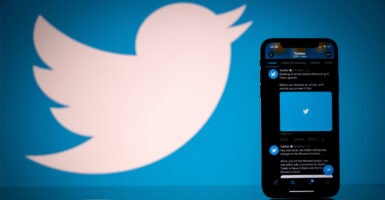Federal Communications Commission member Brendan Carr says the agency should require Big Tech to fund internet infrastructure, following the introduction last week of a bill requiring the FCC to consider collecting contributions from technology companies.
The bill—introduced July 21 by Senate Republicans Roger Wicker, Todd Young, and Shelley Moore Capito—instructs the Federal Communications Commission to look into charging major tech companies such as Google, Facebook, and Netflix to fund broadband networks.

Currently, new internet infrastructure is paid for by the Universal Service Fund, a $9 billion pot of money funded by charges on consumers’ phone service.
“The legislation takes a significant step in the right direction by asking the FCC to look into Big Tech contributing their fair share for the first time,” Carr said in an interview with The Daily Caller News Foundation.
Carr, who had argued for similar legislation in a May op-ed, voiced his support for the bill in a statement calling the current funding mechanism “unfair and unsustainable,” with revenue declining as the tax base shrinks. Under the current model, Big Tech does not pay into the fund at all.
Although Carr views the bill as an important first step, he said actions should be taken within the FCC.
“We don’t even need to wait for the legislation. We could go ahead and require some of these companies to start contributing right now,” Carr said in the interview.
The FCC commissioner pointed to proceedings that the agency could undertake to examine the feasibility of collecting contributions to the Universal Service Fund from Big Tech, but said the agency would need legislation to fully implement his desired measures. Carr also said the bill would build momentum and support for the proposed funding model by attracting public attention.
“I’ve been very pleased with the bipartisan support within the FCC for getting Big Tech to fund the USF, and I see it as a positive sign. It’s got a good right-left coalition behind it,” Carr told The Daily Caller News Foundation.
FCC Chairwoman Jessica Rosenworcel, a Democrat, was open to the idea, calling it “intriguing” in June.
“We should be open to new ideas,” Rosenworcel said in a statement to Communications Daily. “But it’s clear that this would require action from Congress.”
The Universal Service Fund funds programs that provide increased internet access to rural, low-income, and tribal communities as well as schools, libraries, and certain health facilities. It is directly funded by mandated contributions from telecommunications service providers, according to the FCC website.
The FCC says providers directly bill many customers to recover the charges, which Carr said often run as high as 30% of a consumer’s phone bill.
“Big Tech is generating billions or even trillions of revenue, but at the federal level we fund it entirely by putting the charge on the traditional telephone bill of consumers,” Carr said in the interview.
Carr cited a study from the International Telecommunications Society that examined four rural broadband providers, the exact networks the Universal Service Fund is designed to pay for, which found that streaming services Netflix, YouTube, Amazon Prime, Disney+, and Microsoft constituted roughly 75% of network traffic. Up to 94% of the total network costs are related to streaming services, the study found.
“Right now, 100% of the $9 billion we collect and spend every year comes out of the monthly bills that consumers pay, and that tends to skew towards elderly people,” Carr said. “Big Tech businesses are responsible for roughly 90% of the cost of maintaining these networks, yet all the cost is placed on the backs of everyday Americans.”
Although major tech companies don’t fund the Universal Service Fund, they pay internet service providers for bandwidth and often own proprietary internet infrastructure.
For example, Netflix’s Open Connect is a network of servers and cables that connects directly with the local networks of internet service providers, while Amazon operates a global network of cables and data centers.
Carr’s proposal has drawn criticism, with Will Yepez of the National Taxpayers Union arguing that the FCC would be “taxing the internet” and that tech companies would pass on the cost to consumers.
“Some of the Big Tech revenue streams, such as digital advertising, don’t have a consumer-facing charge. Facebook generates billions from that,” Carr said in the interview.
Although streaming services such as Netflix could raise the price of their subscriptions to cover the cost of Universal Service Fund contributions, Carr argued that the cost passed on to consumers would be less than the current tax on phone service.
Content created by The Daily Caller News Foundation is available without charge to any eligible news publisher that can provide a large audience. For licensing opportunities of this original content, email [email protected].
Have an opinion about this article? To sound off, please email [email protected] and we’ll consider publishing your edited remarks in our regular “We Hear You” feature. Remember to include the URL or headline of the article plus your name and town and/or state.






























